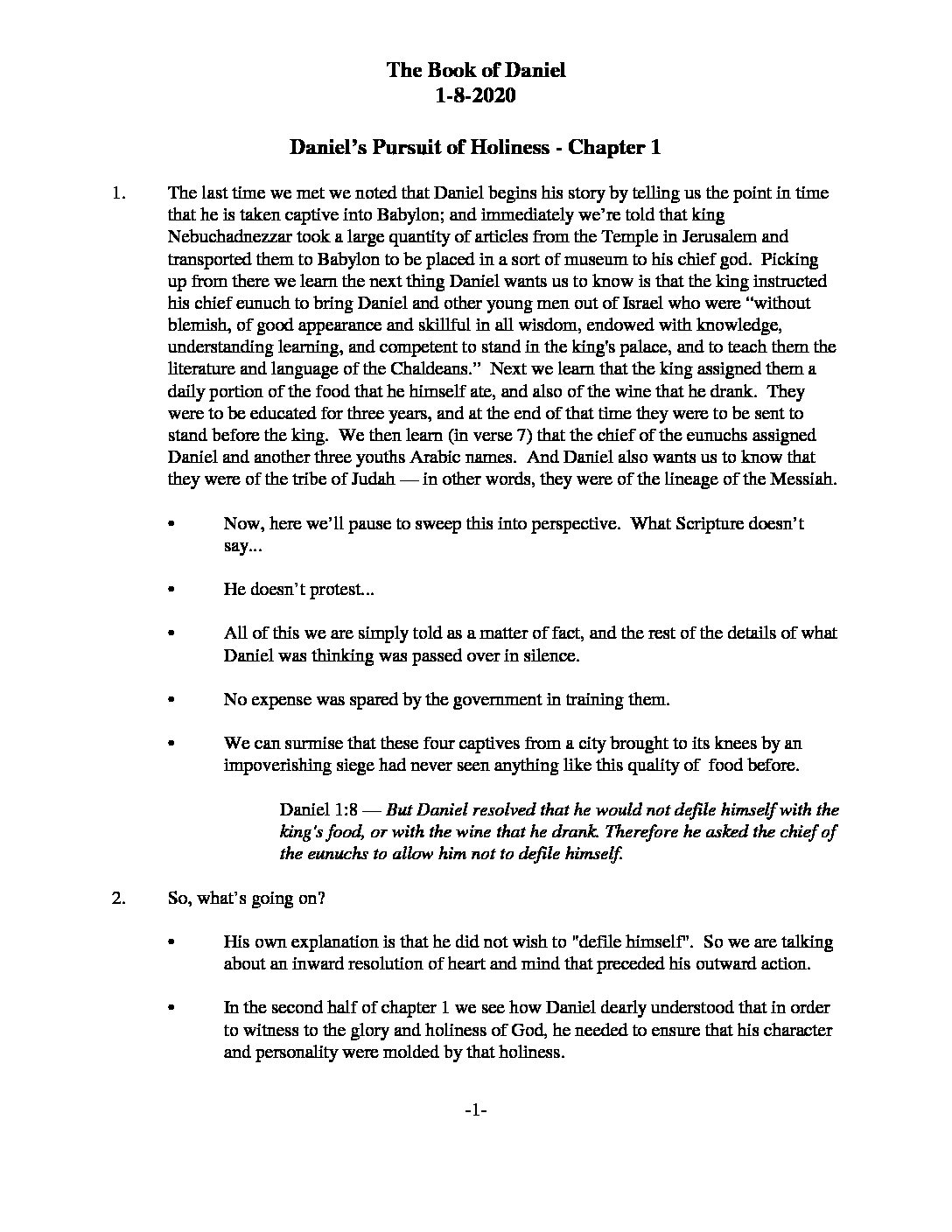The Book of Daniel #3 – Daniel’s Pursuit of Holiness
The Book of Daniel
1-8-2020
Daniel’s Pursuit of Holiness – Chapter 1
- The last time we met we noted that Daniel begins his story by telling us the point in time that he is taken captive into Babylon; and immediately we’re told that king Nebuchadnezzar took a large quantity of articles from the Temple in Jerusalem and transported them to Babylon to be placed in a sort of museum to his chief god. Picking up from there we learn the next thing Daniel wants us to know is that the king instructed his chief eunuch to bring Daniel and other young men out of Israel who were “without blemish, of good appearance and skillful in all wisdom, endowed with knowledge, understanding learning, and competent to stand in the king’s palace, and to teach them the literature and language of the Chaldeans.” Next we learn that the king assigned them a daily portion of the food that he himself ate, and also of the wine that he drank. They were to be educated for three years, and at the end of that time they were to be sent to stand before the king. We then learn (in verse 7) that the chief of the eunuchs assigned Daniel and another three youths Arabic names. And Daniel also wants us to know that they were of the tribe of Judah — in other words, they were of the lineage of the Messiah.
- Now, here we’ll pause to sweep this into perspective. What Scripture doesn’t say…
- He doesn’t protest…
- All of this we are simply told as a matter of fact, and the rest of the details of what Daniel was thinking was passed over in silence.
- No expense was spared by the government in training them.
We can surmise that these four captives from a city brought to its knees by an impoverishing siege had never seen anything like this quality of food before.
Daniel 1:8 — But Daniel resolved that he would not defile himself with the king’s food, or with the wine that he drank. Therefore he asked the chief of the eunuchs to allow him not to defile himself.
2. So, what’s going on?
- His own explanation is that he did not wish to “defile himself”. So we are talking about an inward resolution of heart and mind that preceded his outward action.
- In the second half of chapter 1 we see how Daniel dearly understood that in order to witness to the glory and holiness of God, he needed to ensure that his character and personality were molded by that holiness.
3. Before we try to identify what precisely was involved we should pause to think about this decision…
- In a famous statement the apostle Peter says that Christians are to be characterized by a willingness to engage in discussion: always being prepared to make a defense
to anyone who asks you for a reason for the hope that is in you (1 Peter 3:15). At least, that is the part which is usually cited. - Peter’s full statement can help us to analyze not only why Daniel made his resolution but also how he went about carrying it out.
- Yet these students were thinking of making a move that, at the least, would immediately provoke questioning…
4. What was it that strengthened the hearts and minds of Daniel and his friends, so that they had courage to overcome a natural fear of the unknown?
- How can there be conviction and power in our evangelism if we have not set God apart?
- Daniel also knew that God had frequently warned Israel through Moses and a succession of prophets of the danger of being defiled by the practices of certain neighboring pagan cultures…
5. At an early stage in Israel’s history God communicated this message by instituting certain ritual and ceremonial laws.
- What comes out of a person is what defiles him.
- It was, therefore, God’s prohibition that made the food unclean, which raises the question as to why the food laws were instituted in the first place.
- Following that analogy we can see one possible reason for the imposition of regulations that provided a barrier against negative external influence.
6. Now the obvious drawback with this scheme is that those who are brought up under it could fall into the dangerous error of confusing the keeping of rules and regulations concerning outward ceremonial leanness with real inner moral cleanness.
- When Christ came he cancelled the system of food laws (Mark 7:19), and something completely new took its place.
7. A second reason for their action has to do with the slaughtering and preparation of meat.
8. The third possible reason for Daniel’s refusal may have been that the food had been sacrificed to idols…
- Libraries and educational institutions in particular were closely attached to temples in the major cities of the empire.
9. Daniel gives us an important bit of evidence that points strongly in this direction.
- So, the golden goblets mentioned in the first half of chapter 1, and the wine mentioned in the second half, come together in a spectacular and tragic way in the fateful banquet of pagan worship described in Daniel 5.
- In light of this, it is surely not unreasonable to think that Daniel, even in his early days as a student, saw the danger of compromising his loyalty to God.
- If this is the case, Daniel’s protest was in essence a protest against the idolatrous world-view of the Babylonians — a world-view that formed the background
paradigm for their educational system. - But how is this to be done? Daniel tells us how he and his friends responded to their situation.

